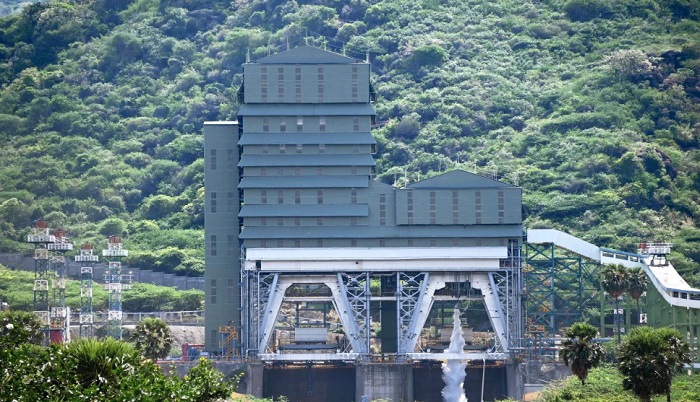
The Indian Space Research Organisation has sucessfully commenced testing of its semi-cryogenic engines that would power future launch vehicles.
The very first integrated test on an intermediate configuration of the 2000 kN (Kilonewton) semi-cryogenic engine carried out at the newly-commissioned Semicryogenic Integrated Engine & Stage Test facility at ISRO Propulsion Complex (IPRC) at Mahendragiri in Tamil Nadu on Wednesday was successful, the Bengaluru-headquartered national space agency said.
The test is a step towards developing a 2000 kN thrust engine, which works on Liquid Oxygen (LOX)-Kerosene propellant combination, for future launch vehicles, an ISRO statement said.
The intermediate configuration, designated as Power Head Test Article (PHTA), comprises all the engine systems except the thrust chamber.
It was the first of a series of tests planned to validate the design of the propellant feed system, including the low-pressure and high-pressure turbo-pumps, the gas generator, and control components.
The Liquid Propulsion Systems Centre (LPSC) of ISRO has undertaken the design & development of a semi-cryogenic engine with 2000 kN thrust with Indian industry participation, and it will power the booster stages of future launch vehicles.
Wednesday’s test is a major milestone before integrating the complete engine and its qualification, ISRO said.
“This test demonstrated the complex chill-down operations spanning about 15 hours duration that was conducted successfully, meeting all the required conditions for engine start. After the chill down of the LOX circuit, the feed circuit of kerosene was filled, and LOX was admitted into the gas generator by opening the injection valve. Successful performance of the test article helps derive the sequence of operations for further tests,” it said.
The new facility at IPRC with a state-of-the-art Programmable Logic Controllers-based control system and data acquisition system, is capable of testing semi-cryogenic engines up to 2600 kN thrust and will support the subsequent testing and qualification of the fully integrated semi-cryogenic engine and stage, ISRO said.
This test, the space agency said, has demonstrated the successful performance of the test facility and PHTA in the first attempt itself.
According to ISRO, the Semi Cryogenic Propulsion System Project envisages the design and development of a 2000 kN semi-cryogenic engine and ‘SC120 stage’ that will enable the development of a heavy-lift capability for future Indian space transportation systems. (NDTV)


